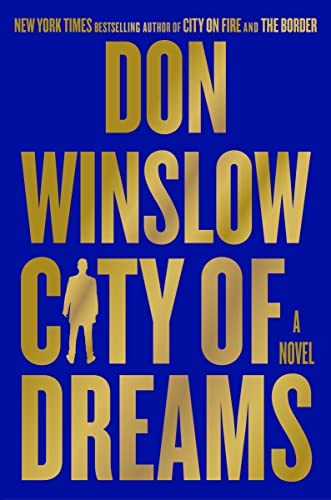
At the end of City on Fire, Danny Ryan was on the run from law enforcement and the Moretti crime family, the Rhode Island branch of the mafia. The former believe he killed one of their own, a corrupt FBI agent, and the latter think he made off with a cache of heroin. He takes with him his aging father and his infant son (as did Aeneas, the narrator of The Aeneid), along with a few loyal followers.
Danny actually did shoot FBI agent Jardine, arguably in self defense. As for the millions of dollars worth of heroin, Danny tossed that in the ocean, although few believe him. He and his ragtag gang go west, keeping their heads as low as possible. Danny has very limited resources and no experience raising a toddler. He needs money and he needs to find a way to keep people from wanting to kill him, including the FBI agent who was Jardine’s lover.
The solution to his problems is handed to him on a platter by another government agent. All he has to do is rob a cartel safe house containing untold millions and his legal and fiscal problems will go away. He can pay off any financial obligations the Morettis feel they’re owed and start a new life without constantly looking over his shoulder. Of course, the Mexican cartel won’t be happy about the robbery, but they won’t have any idea who hit them. At least that’s the plan.
Where’s young Ian, Danny’s son, during all this? Danny has, reluctantly, reconnected with his mother, Madeleine McKay, who abandoned him as a boy, leaving his alcoholic, neglectful father to raise him. Madeleine has leveraged her beauty and wiles into an empire of her own in Las Vegas. Little Ian soon has the run of the estate and she looks after the boy while Danny sorts things out.
The life of the idle rich isn’t for Danny, though. He wants to work. The solution to this dilemma comes via a couple of his goons. A former bartender at the Glocca Morra, a Providence pub where the Ryans planned their illegal activities, sold Hollywood producers a movie treatment about the events chronicled in City on Fire. The film has been fast-tracked and the troubled actress cast as Pam Davies, the Helen of Troy who inadvertently ignited the war between the Irish and Italian mobs, thinks this might be her Oscar-winning role. Two of Danny’s henchmen have weaseled their way into the production, first offering their services as consultants and then using their mob skills to leverage a bigger piece of the action. The producers approach Danny to rein his men in. Instead, he becomes directly involved in the production and with the leading lady. He also begins to clear the set of corrupt behavior he recognizes from his former life in Rhode Island. This section of the novel might remind readers of Elmore Leonard’s novel Get Shorty.
Although the gang in Los Angeles is a shadow of its former self, they resent an outsider muscling into their territory. Once again, Danny finds himself in trouble with the mob. His involvement with the movie’s star puts him in a situation reminiscent of choices his now-deceased brother-in-law Liam made that led to their problems back east. He’s smart enough to recognize this, but his solution to the crisis has an unexpected and unintended outcome. In the aftermath, Danny heads to Las Vegas, where he will, no doubt, experience further difficulties in the trilogy’s conclusion, City of Ashes.
As career criminals go, Danny is a pretty decent fellow. He wants to be a good father—better than his old man was, at least—and he’s ready to find love again after the tragic death of his wife. Despite his best intentions, he can’t manage to stay out of trouble, although he manages to find a way back out again each time.
One could argue that Danny rarely solves his own problems but is, rather, the regular benefactor of outside assistance. His estranged mother helped him when he was injured during the Providence gang war and facilitated the deal with the feds that got him free of legal problems. For their part, the feds helped make Danny financially independent. And, when things look dire during a mushroom-fuelled hallucination episode, he once again benefits from just-in-time help from an unexpected source.
Given that Winslow has been inspired by the Greek epics, these frequent deus ex machina episodes are, perhaps, to be expected.

